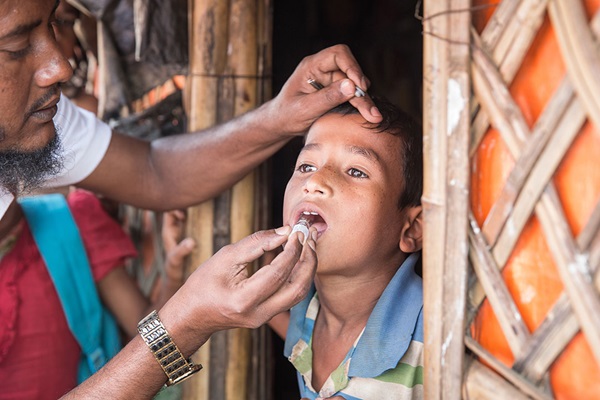
A dramatic rise in vaccine coverage across Africa is saving millions of lives and shielding communities from deadly but preventable diseases, including measles, polio and cervical cancer.
In 2023 alone, an estimated 1.8 million lives were saved in the African region through routine immunisation efforts – almost half of the 4.2 million lives saved globally, according to data released by the World Health Organisation (WHO). These remarkable outcomes are being driven by robust government commitment and collaboration with global partners such as Gavi, the Vaccine Alliance, UNICEF, WHO and others.
A standout success has been the reach to “zero-dose” children – those who have not received even one dose of essential vaccines. Since 2024, more than 5 million such children in 20 high-priority African countries have been reached through the ‘Big Catch-Up’ campaign. Launched in 2023, the initiative seeks to recover immunisation services disrupted by the COVID-19 pandemic and to safeguard communities from outbreaks of vaccine-preventable diseases.
Despite a rise in the number of births between 2022 and 2023, the region saw a two-percentage-point increase in the coverage of the diphtheria-tetanus-pertussis (DTP3) vaccine among one-year-olds, moving from 72 per cent to 74 per cent. This growth is not only a sign of post-pandemic recovery but also evidence that governments are successfully expanding immunisation coverage. Countries such as Cameroon, Chad, Côte d’Ivoire, Ethiopia, Madagascar, Malawi, Mozambique and Uganda recorded particularly notable gains.
Progress has also been made in protecting adolescent girls from cervical cancer. Human papillomavirus (HPV) vaccination coverage (single-dose) increased significantly from 28 per cent in 2022 to 40 per cent in 2023. This makes Africa the region with the second-highest HPV coverage globally and marks a crucial step toward empowering girls and preventing a disease that claims a woman’s life every two minutes worldwide.
The region has seen dramatic progress in the battle against polio. From 2023 to 2024, cases of circulating variant poliovirus type 1 dropped by 93 per cent, while a 65 per cent decline was recorded in just the past year. These reductions are the result of intensified efforts, especially in countries that had previously struggled with sustained transmission.
This year’s World Immunisation Week and African Vaccination Week are being celebrated under the unified theme “Immunisation For All is Humanly Possible”. The campaign emphasises the critical role vaccines play in protecting people of all ages and across all communities.
“We have made great progress in expanding vaccination and saving lives, thanks to the dedication of governments and partners,” said acting WHO regional director for Africa, Dr. Chikwe Ihekweazu. “But we still have more ground to cover. We must sustain and expand these life-saving efforts to build a stronger, healthier future for all.”
While the gains are impressive, challenges remain. One in four children across the continent remains under-vaccinated and one in five is still completely unvaccinated. These gaps leave the region vulnerable to dangerous outbreaks, particularly measles, which continues to pose a significant public health threat.
Persistent barriers hinder access to vaccines in many areas. These include insecurity and conflict in hard-to-reach regions, logistical difficulties, cold chain limitations and vaccine hesitancy driven by misinformation. Moreover, many immunisation programmes are underfunded and face disruptions due to public health emergencies, including disease outbreaks and natural disasters.
“The progress seen across African countries – bolstered by an unprecedented level of co-financing from African governments in 2024 – demonstrates the tangible impact of sustained commitment,” said chief country delivery officer at Gavi, the Vaccine Alliance, Thabani Maphosa. “However, this momentum must not stall. Conflict, displacement, population growth and climate-related emergencies are creating ideal conditions for outbreaks. Securing adequate funding and sustained political will is essential to protect the gains made.”
To maintain and accelerate the continent’s progress, Gavi has launched its new five-year strategy, Gavi 6.0. The strategy is anchored on three core goals: protecting the world from pandemics and outbreaks, vaccinating more children against more diseases than ever before, and reducing the number of zero-dose children. One of its most ambitious targets is to reach 50 million children with the malaria vaccine by 2030.
Successful implementation of Gavi 6.0 depends on strong support from donor governments, private sector partners, and African nations themselves. As 2025 marks the halfway point of the Immunisation Agenda 2030 – a global strategy aimed at preventing disease, promoting equity and strengthening immunisation programmes – mobilising resources and partnerships is more crucial than ever.
To advance these goals, African governments and their partners are being urged to accelerate the reduction of zero-dose children, scale up routine immunisation, fast-track malaria vaccine rollouts and expand access to HPV vaccines. Regional cooperation will be vital to overcome obstacles and embed lasting systems of care.
Key recommendations include boosting investment in health systems and infrastructure, enhancing surveillance to detect and respond swiftly to outbreaks, countering vaccine misinformation, increasing domestic financing for immunisation, leveraging technology and innovation for vaccine delivery, and supporting research and development into new vaccines.
A significant milestone toward health self-reliance in Africa came in 2024 with the launch of the African Vaccine Manufacturing Accelerator (AVMA). Backed by Gavi and partners, AVMA is a $1.2 billion financing mechanism designed to boost vaccine manufacturing capacity across Africa over the next decade. Two new agreements were signed earlier this year under AVMA, signalling momentum toward a more secure and sustainable vaccine supply chain on the continent.
As the global community marks Immunisation Week, Africa’s story is one of triumph, tenacity, and a future full of promise – if progress can be preserved and expanded.

